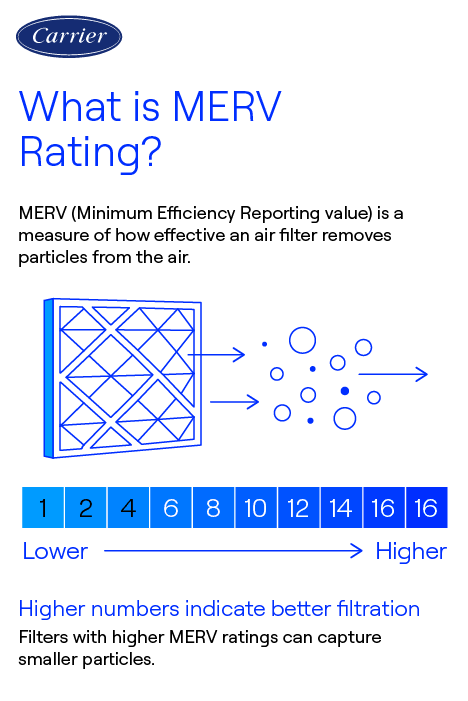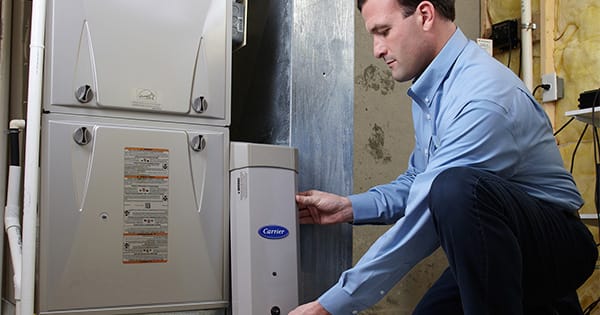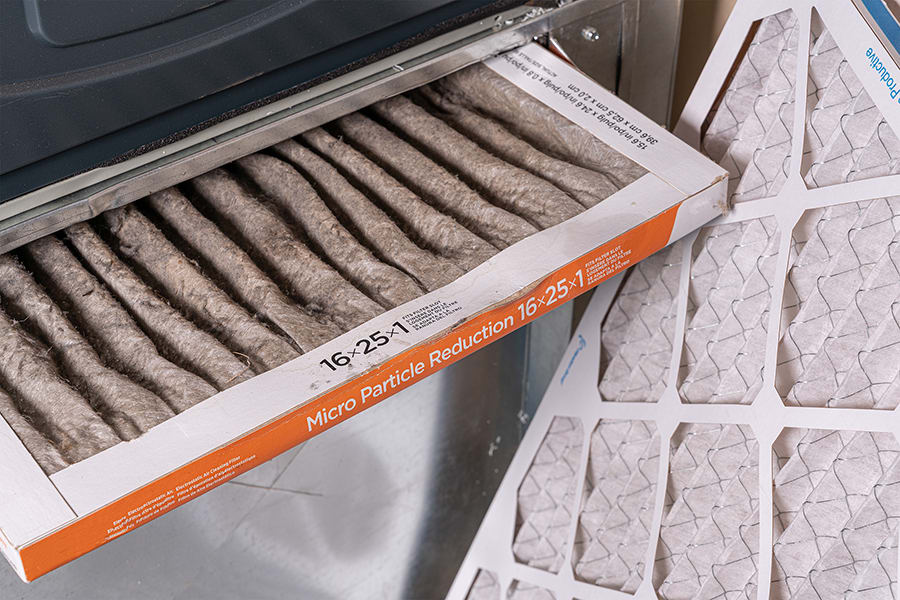What is MERV Rating? A Comprehensive Guide
Maintaining clean and healthy indoor air is crucial, and understanding MERV ratings is a key part of this process. MERV, or Minimum Efficiency Reporting Value, is a rating system that measures the effectiveness of air filters in capturing particles from the air. In this comprehensive guide, we'll delve into the question “What is a MERV rating?”, how to choose the right rating for your home, and how to maintain optimal air quality with MERV filters.
What Is A MERV Rating?

A MERV rating, short for Minimum Efficiency Reporting Value, is a measurement used to determine an air filter's effectiveness. This industry standard helps consumers understand how well a clean and new filter captures airborne particles. Essentially, the higher the MERV rating, the more efficient the filter is at trapping particles. In general, filters are most effective when they are clean and new.
The primary purpose of a MERV rating is to assess a filter's ability to improve indoor air quality. Higher MERV ratings capture a wider variety of particles, including dust, pollen, pet dander, mold spores, and even smaller particles like bacteria and viruses. By trapping these contaminants, filters with higher MERV ratings contribute to cleaner and healthier indoor environments.
The MERV Rating Scale Explained
Understanding the MERV scale is important when selecting an air filter for your home. The scale ranges from 1 to 16, with higher numbers indicating greater filtration efficiency.
- Filters with MERV ratings between 1 and 5 are low-efficiency and are mainly used as prefilters to remove large coarse particles and other debris.
- Filters rated between 6 and 9 are low-efficiency and are good at protecting equipment, but can also capture some percentage of larger particles that may include potential irritants such as pet dander, dust, and pollen.
- Filters rated between 10 and 12 are medium-efficiency and provide better filtration for most residential applications.
- Filters rated between 13 and 16 are considered higher-efficiency, providing higher fine particle efficiency starting with MERV 13 which captures on average a minimum of 50% of all particles, including the fine particles sized 0.3 to 1.0 micron, that pass through the filter when the HVAC system is running.

Choosing The Right MERV Rating For Your Home
When selecting the right MERV rating for your home's HVAC system, several factors must be considered to ensure enhanced indoor air quality and system performance:
- Household needs: Are there family members with allergies or respiratory conditions? Do you have pets? These factors can impact the level of filtration required to maintain a healthy indoor environment.
- Level of airborne contaminants in your area: If you live in a highly polluted or dusty environment, a higher MERV rating may be necessary to effectively capture these particles and prevent them from circulating in your home.
- Your HVAC system: Higher MERV filters restrict airflow more, which can strain some HVAC systems not designed for them. Always check your HVAC system’s specifications before upgrading.
Maintaining Optimal Indoor Air Quality With MERV Filters
Using MERV filters in your HVAC system brings several benefits:
- Enhanced air quality: MERV filters can help reduce allergens and airborne irritants, which can help make the air cleaner and healthier to breathe.
- HVAC lifespan and efficiency: MERV filters can help protect your HVAC system from dust and debris, which can help extend its lifespan and improving its efficiency.
- Improved home environment: By removing particles from the air, MERV filters can help contribute to a cleaner home environment, reducing the need for frequent dusting and cleaning.
MERV Filter Maintenance
Proper maintenance and regular filter replacement are essential to ensure the continued effectiveness of MERV filters. Learn more about how to change air conditioner filters and factors that impact how often to replace the air filter. Typically, larger 4” filters need to be replaced less often than smaller 1” filter due to their increased surface area and ability to capture more particles. Regular maintenance also includes keeping the filter housing clean and ensuring proper airflow through the system. 
MERV Ratings And Air Filtration Misconceptions
MERV ratings play a crucial role in determining the efficiency of air filters and the overall indoor air quality. However, several misconceptions surrounding MERV ratings need to be clarified.
One common misconception is that the higher the MERV rating, the better the air quality. While higher MERV ratings do indicate better filtration, it's important to consider the specific needs of your home. Filters with very high MERV ratings might not be suitable for all HVAC systems, as they can restrict airflow and strain the system. The effectiveness of a filter to help reduce particulates in the home depends on the whole home HVAC system operation and effectiveness, i.e. “fan on” mode and adequate airflow through the system.
Connect With A Carrier Dealer On Air Filters and MERV Ratings
While general guidelines can be helpful, it's always recommended to consult with your local Carrier dealer for personalized recommendations. They can assess your specific needs, consider factors like the size of your home, the number of occupants, and any existing health concerns, and provide expert advice on the most suitable MERV rating and air filtration system for your situation.

Frequently Asked Questions About MERV Rating
Learn More About Air Filters
- Learn about Air Conditioner Filters
- How Often to Change AC Filter
- Learn How to Change Air Conditioner Filters
- Explore furnace filters

